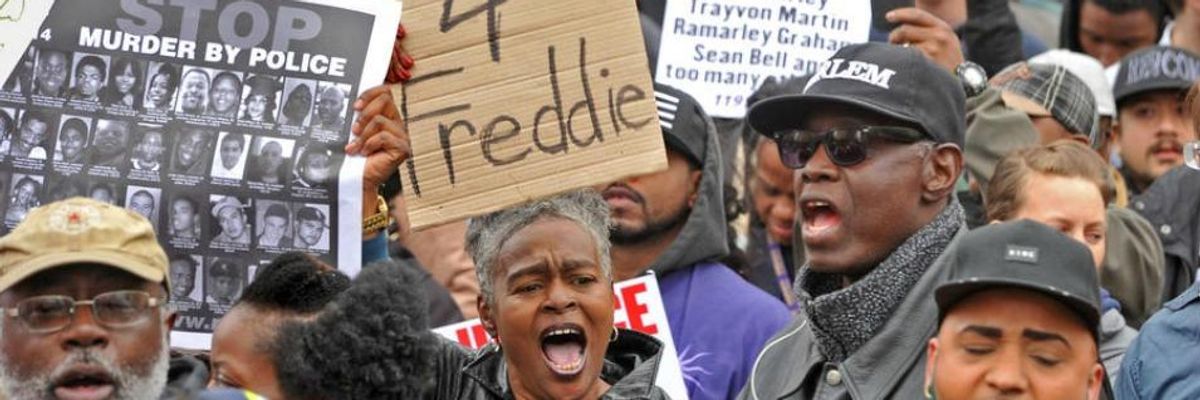The largest protest yet over the recent death of Freddie Gray is expected to take place in Baltimore on Saturday, with community members and a coalition of racial justice and civil rights groups planning to take to the streets in force as they demand justice for the 25-year-old black man who was killed while in police custody earlier this month. The demonstrators will also call attention to a longer pattern of abuse by the Baltimore Police Department which fits into increasingly larger and widespread concerns over how minority communities are treated by law enforcement nationwide.
Organizers for the march said residents will rally at 3 PM on Saturday near the Western District police station and also near where Gray was arrested before a march to City Hall for a rally scheduled for 5 PM.
"This tide, this wave will roll downtown to City Hall," said Malik Z. Shabazz, one of the protest organizers and an attorney with the Washington D.C.-based Black Lawyers for Justice. "There will be some thousands in the streets demanding justice. We are in solidarity with them."
He added, "It cannot be business as usual with that man's spine broken, with his back broken, with no justice on the scene."
Gray died in a local Baltimore hospital on April 19 from a severe neck injury just over a week after he was "violently" arrested by officers and forcibly placed, handcuffed and shackled, into a police van. The injuries that Gray received were so dramatic that "80 percent of his spinal cord was severed." Though Baltimore police have acknowledged that protocols were not followed and has temporarily suspended six officers involved with the arrest, Gray's family and the community at large say that too little has been done and that Gray, who did nothing other than flee a scene after "making eye contact" with an officer, should never have been arrested in the first place.
"Running while black is not a crime," said Billy Murphy, an attorney for the Gray family, this week. "Felony running does not exist... And the lesson here was, he should have run -- and he didn't run fast enough."
Initial days of protests immediately followed Gray's death, but Saturday's planned rally and marches are seen as the culmination of a week of grief and outrage over the perceived failure of the police response so far and a chance for the community and outside supporters to come together to highlight and speak out, not only about how Gray was treated but to the deeper tensions his death has brought to the surface.
Despite whether or not it ever becomes known exactly how Gray was injured so severely, the violence he experienced while in police custody--which comes at a time when the national Black Lives Matters movement has triggered a wave of protests and heightened scrutiny about how low-income and predominantly minority communities are treated by law enforcement and the justice system--has now given the city of Baltimore its opportunity to engage fully with this debate. And its residents--who observers note are too often forgotten or ignored--are taking advantage of Gray's troubling arrest and tragic end to speak to a national audience about what it means to live in a city wracked by crime while also being the consistent victims of an oppressive, and often brutal, style of policing that has become endemic across the country.
As journalist Oliver Laughland, writing for the Guardian, reported from Baltimore early on Saturday:
Irrespective of the legality of his apprehension, the death of Freddie Gray has become a lightning rod for the frustrations those in community feel towards a police force accused of routine brutality and racial profiling. Public officials have called for calm as protests continue to grip the city. They hope his death will mark a turning point.
"Freddie Gray will not die in vain," said Nick Mosby, councilman for the seventh district of Baltimore, which incorporates both the location of Gray's arrest and the Western District police station where protesters have congregated for six days on end. "I see change coming to Baltimore city. At the end of the day we can't rest on anything less."
